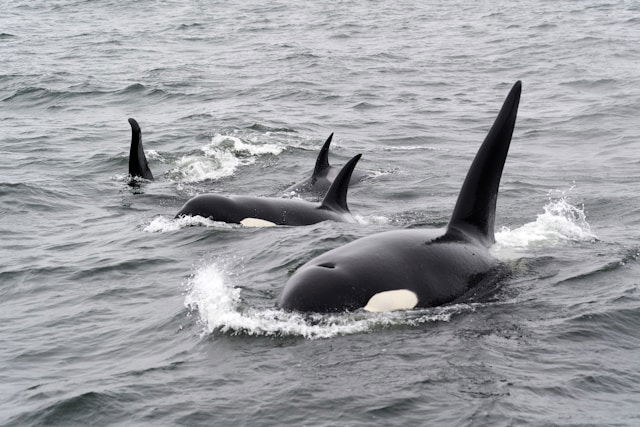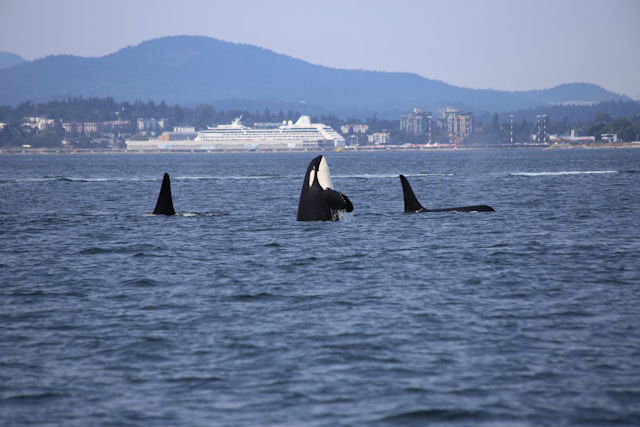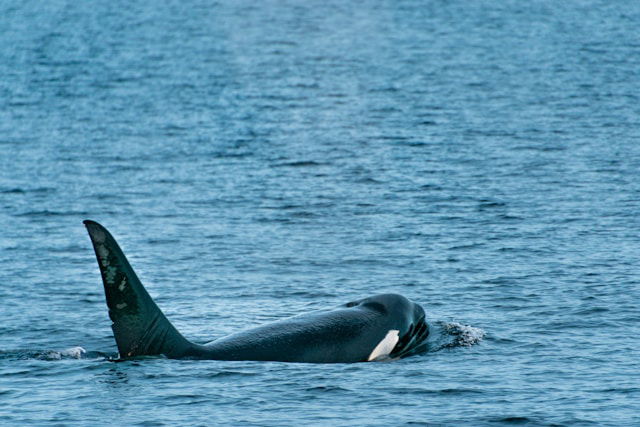Orcas using kelp as grooming tools reveal their smart and social side. In a behavior researchers call allokelping, these killer whales use bull kelp to groom each other. It’s a fascinating insight into tool use, culture, and caring connections in marine life.
Tool-Touch Behavior Among Orcas

Scientists recently filmed orcas in the Salish Sea biting off bull kelp stalks, placing them between two whales, and rolling the kelp along their bodies. This collaborative action, where one whale cleans another, marks a first for marine mammals. It shows not just curiosity or play – it’s a purposeful tool used with mutual care.
This behavior isn’t just about getting rid of dead skin, though that is likely a benefit. It’s also about connection. Bonding through grooming builds trust across orca family groups, much like primates use touch to strengthen social ties.
How Orcas Make and Use Kelp Tools
The technique is clever: orcas use their teeth to detach flexible kelp stalks, then use their strong bodies to position the kelp between them and a partner. They twist and move in sync, repeating the process to groom one another. This is active tool-making and collaborative use, rare among non-human animals. It’s not accidental; it’s deliberate and shared.
Researchers say this is groundbreaking because orcas are manufacturing tools intentionally, not just finding objects and using them, but actively shaping them for mutual use. Unlike dolphins or sea otters, who use tools primarily for feeding or protection, orcas use tools for social and health benefits.
Everyone Loves a Kelp Spa

Drone footage from the spring and summer of 2024 recorded orcas of all ages and both sexes engaging in allokelping. The whales often paired up with relatives or peers of similar age, hinting at their role in maintaining pod harmony.
The behavior was frequent and observed on most days of the study, suggesting it’s an established activity within this community. Particular whales with patchy or peeling skin were seen engaging more, highlighting the grooming angle.
Skin Care and Social Bonds
Orca skin, constantly renewed, needs shedding. The kelp comes with antibacterial and anti-inflammatory properties thanks to its makeup, including brown algae compounds. Rubbing it along the skin likely aids in exfoliating and maybe even in preventing infection.
Yet this is more than a skincare routine. The repeated close contact and shared tool use strengthen social cohesion in the pod, helping orcas maintain strong relational bonds, reduce stress, and establish trust.
A Rare Case of Social Tool Use
Historically, tool use in animals has been tied to foraging: chimps use sticks to get termites, sea otters crack shells with stones, and dolphins probe the ocean floor with sponges. What makes allokelping stand out is its focus on social interaction, not food. This is one of the few documented cases where animals make tools to aid their social lives.
Technology and Discovery

The discovery came from high-resolution drone footage. Unlike earlier aerial techniques, this tech allowed researchers to zoom in with clarity, revealing whales balancing kelp stalks, shaving bits off, and rolling them on each other.
Despite decades of study, this orca pod is one of the most monitored marine mammal groups, and this behavior remained unnoticed until recently. It shows we still have much to learn, even about familiar species.
Cultural Traditions at Risk
These orcas belong to the critically endangered southern resident population in the Salish Sea; only about 73 individuals remain. Their survival hinges on Chinook salmon, which have declined due to habitat issues, dam building, and warming waters.
Their bull kelp habitats are also threatened by rising oceans. As kelp diminishes, so might their ability to engage in this spa-like tool behavior. Losing these cultural traditions would be a profound loss, not just of whales, but of unique behaviors.
This discovery underscores the need for holistic conservation. Protecting orcas means protecting their ecosystems: healthy kelp forests, abundant salmon runs, and noise-free waters. It’s not enough to save animals in isolation; we must safeguard the cultural practices that define them.
Researchers plan to study whether allokelping is widespread in other pods and explore long-term health impacts. More drone-based studies could uncover additional social tool behaviors in cetaceans.
Allokelping captures a new facet of orca intelligence and empathy. The whales’ shared use of kelp tools for skin care and connection is a remarkable reminder that tool use extends far beyond simply surviving; it can nourish relationships and culture.
This positive discovery highlights the intricate lives of orcas at risk. The more we understand, the more responsibility we have to protect the environments that sustain these vibrant, social creatures. Let’s ensure the Salish Sea continues to be a place for kelp, care, and the deep bonds of orca pods.
